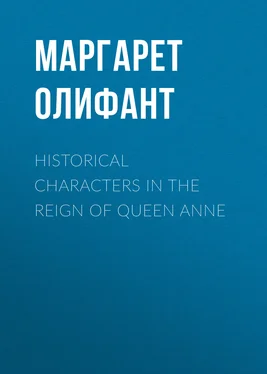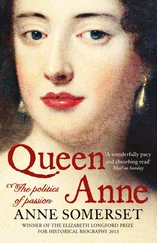Маргарет Олифант - Historical Characters in the Reign of Queen Anne
Здесь есть возможность читать онлайн «Маргарет Олифант - Historical Characters in the Reign of Queen Anne» — ознакомительный отрывок электронной книги совершенно бесплатно, а после прочтения отрывка купить полную версию. В некоторых случаях можно слушать аудио, скачать через торрент в формате fb2 и присутствует краткое содержание. Жанр: foreign_prose, История, foreign_edu, foreign_antique, на английском языке. Описание произведения, (предисловие) а так же отзывы посетителей доступны на портале библиотеки ЛибКат.
- Название:Historical Characters in the Reign of Queen Anne
- Автор:
- Жанр:
- Год:неизвестен
- ISBN:нет данных
- Рейтинг книги:3 / 5. Голосов: 1
-
Избранное:Добавить в избранное
- Отзывы:
-
Ваша оценка:
- 60
- 1
- 2
- 3
- 4
- 5
Historical Characters in the Reign of Queen Anne: краткое содержание, описание и аннотация
Предлагаем к чтению аннотацию, описание, краткое содержание или предисловие (зависит от того, что написал сам автор книги «Historical Characters in the Reign of Queen Anne»). Если вы не нашли необходимую информацию о книге — напишите в комментариях, мы постараемся отыскать её.
Historical Characters in the Reign of Queen Anne — читать онлайн ознакомительный отрывок
Ниже представлен текст книги, разбитый по страницам. Система сохранения места последней прочитанной страницы, позволяет с удобством читать онлайн бесплатно книгу «Historical Characters in the Reign of Queen Anne», без необходимости каждый раз заново искать на чём Вы остановились. Поставьте закладку, и сможете в любой момент перейти на страницу, на которой закончили чтение.
Интервал:
Закладка:
Lady Clarendon was the wife of the great chancellor’s son, and was thus the aunt, by marriage, of the princess—not always a very endearing relationship. She was not a great lady by birth, and though a friend of Evelyn’s and a highly educated woman, might easily be supposed to be a little oppressive in a young household where her relationship gave her a certain authority.
The prince was dull, the princess had not many resources. They settled down in homely virtue, close to the court with all its scandals and gaieties, but not quite of it; and nothing could be more natural than that Anne should eagerly avail herself of the always amusing, always lively companion who had been the friend of her youth. The Cockpit, which was Anne’s residence, had been built as a royal playhouse, first for the sport indicated by its name, then for the more refined amusements of the theater, but had been afterward turned into a private residence, and bought by Charles II. for his niece on her marriage. It formed part of the old palace of Whitehall, and must have been within sight and sound of the constant gaieties going on in that lawless household, in the best of which the princess and her attendant would have their natural share. No doubt to hear Lady Churchill’s lively satirical remarks upon all this, and the flow of her brilliant malice, must have kept the household lively, and brightened the dull days and tedious waitings of maternity, into which Anne was immediately plunged, drawing a laugh even from stupid George in the chimney-corner. And there was this peculiarity to make the whole more piquant; that it was virtue, irreproachable, and no doubt pleasantly self-conscious of its superiority, which thus got its fun out of vice. The two young couples on the other side of the way were immaculate, devoted exclusively to each other, thinking of neither man nor woman save their lawful mates. Probably neither the princess nor her lady in waiting were disgusted by gossip about the Portsmouths and Castlemaines, but took these ladies to pieces with indignant zest and spared no jibe. And though the remarks might be too broad for modern liking, and the fun somewhat unsavory, we cannot but think that amidst the noisy and picturesque life of that wild Restoration era, full of corruption, yet so gay and sparkling to the spectator, this little household of the Cockpit is not without its claims upon our attention. There was not in all Charles’s court so splendid a couple as the young Churchills: he already one of the most distinguished soldiers of the age, she a beautiful young woman overflowing with wit and energy. And Princess Anne was very young; in full possession of that beauté de diable which, so long as it lasts, has its own charm, the beauty of color and freshness and youthful contour. She had a beautiful voice, the prettiest hands, and the most affectionate heart. If she were not clever, that matters but little to a girl of twenty, taught by love to be receptive, and called upon for no effort of genius. Honest George behind backs was not much more than a piece of still life, but an inoffensive and amiable one, taking nothing upon him. If there was calculation in the steadfastness with which the abler pair possessed themselves of the confidence, and held fast to the service of their royal friends, it would be hard to assert that there was not some affection too, at least on the part of Sarah, who had known every thought of her little princess’s heart since she was a child, and could not but be flattered and pleased by the love showered upon her. At all events, in Anne there was no unworthy sentiment; everything about her appeals to our tenderness. When she attained what seems to have been the summit of her desires and secured her type of excellence, the admired and adored paragon of her childhood, for her daily companion, the formal titles and addresses which her rank made necessary became irksome beyond measure to the simple-hearted young woman whose hard fate it was to have been born a princess. The impetuosity of her affection, her rush, so to speak, into the arms of her friend, her pretty youthful sentiment, so fresh and natural, her humility and simplicity, are all pleasant to contemplate. Little more than a year after her marriage, after the closer union had begun, she writes thus:
If you will let me have the satisfaction of hearing from you again before I see you, let me beg of you not to call me “your highness” at every word, but to be as free with me as one friend ought to be with another. And you can never give me any greater proof of your friendship than in telling me your mind freely in all things, which I do beg of you to do: and if it ever were in my power to serve you, nobody would be more ready than myself. I am all impatience for Wednesday. Till then farewell.
Upon this there ensued a little sentimental bargain between the two young women. It was not according to the manners of the time that they should call each other Anne and Sarah, and the fashion of the Aramintas and Dorindas had not yet arrived from Paris. They managed the transformation necessary in a curiously matter-of-fact and English way:
She grew uneasy to be treated by me with the form and ceremony due to her rank; nor could she bear from me the sound of words which implied in them distance and superiority. It was this turn of mind which made her one day propose to me that whenever I should happen to be absent from her we might in all our letters write ourselves by feigned names, such as would import nothing of distinction of rank between us. Morley and Freeman were the names her fancy hit upon, and she left me to choose by which of them I should be called. My frank open temper led me naturally to pitch upon Freeman, and so the princess took the other; and from this time Mrs. Morley and Mrs. Freeman began to converse as equals, made so by affection and friendship.
Very likely these were the names in some young lady’s book which had been in the princess’s childish library,—something a generation before the “Spectator,”—in which rural virtues and the claims of friendship were the chief subjects. Morley is one of the typical names of sentimental literature in the eighteenth century, and might be originally introduced by some precursor of those proper little romances which have in all ages been considered the proper reading for “the fair.”
Mrs. Morley could be no other than the gentle ingénue , the type of modest virtue, and Freeman was of all others the title most suitable for Sarah, the bright and brave. Historians have not been able to contain themselves for angry ridicule of this
little friendly treaty. To us it seems a pretty incident. The princess was twenty, the bedchamber woman twenty-four. Their friendly traffic had not to their own consciousness attained the importance of a historical fact.
The locality in which the royal houses in London stood was very different then from its appearance now. Whitehall at present is a great thoroughfare, full of life and movement, with but one remnant of the old palace,—once the banqueting-hall, now the chapel royal, where the window out of which Charles I. is supposed to have passed to the scaffold is pointed out to strangers,—and still presenting a bit of gloomy, stately front to the street.
St. James’s Park opposite is screened off and separated now by the Horse Guards and other public buildings, a long and heavy line which forms one side of the way. But in those days there were neither public buildings nor busy street. The palace, straggling and irregular, with walls and roofs on many different levels, stood like a sort of royal village between the river and the park, with the turrets of St. James twinkling in the distance, in the sunshine, over the trees of the Mall, where King Charles with all his dogs and gentlemen would stream forth daily for his saunter or his game. The Cockpit was one of the outlying portions of Whitehall upon the edge of the park.
Читать дальшеИнтервал:
Закладка:
Похожие книги на «Historical Characters in the Reign of Queen Anne»
Представляем Вашему вниманию похожие книги на «Historical Characters in the Reign of Queen Anne» списком для выбора. Мы отобрали схожую по названию и смыслу литературу в надежде предоставить читателям больше вариантов отыскать новые, интересные, ещё непрочитанные произведения.
Обсуждение, отзывы о книге «Historical Characters in the Reign of Queen Anne» и просто собственные мнения читателей. Оставьте ваши комментарии, напишите, что Вы думаете о произведении, его смысле или главных героях. Укажите что конкретно понравилось, а что нет, и почему Вы так считаете.












